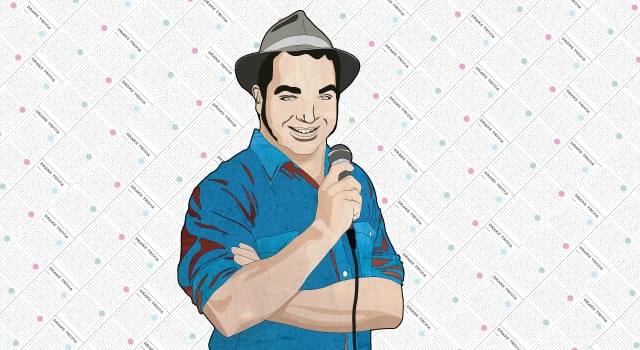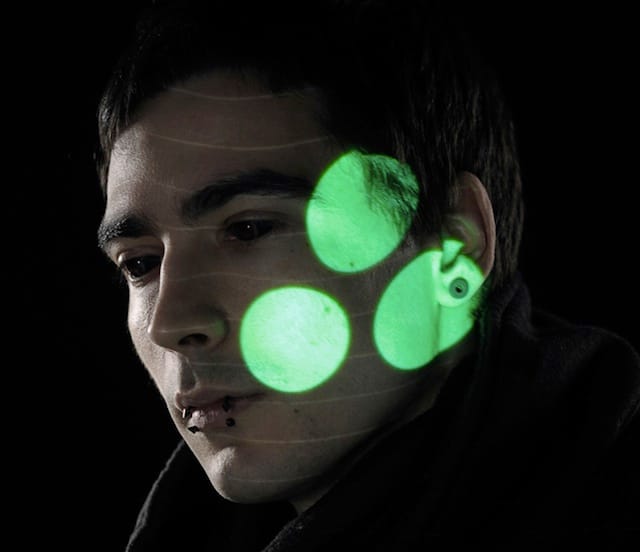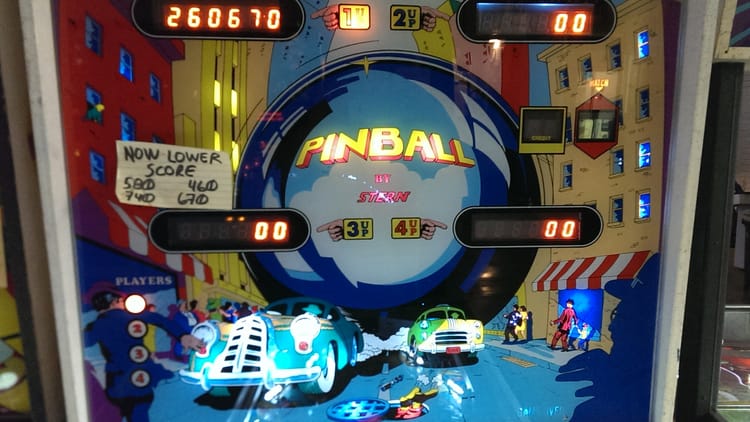The Quizmaster

His sideburns are what you notice first, mutton chops that give him the air of an Elvis impersonator on his day off. You wouldn’t guess that everybody is here to see him, that for some of these people it’s the third time this week they’ve watched him. He sneaks a look as his laptop.
“Tonight is trivia night at the Drake. If you do not have an answer sheet, let me know!”
It’s at this point that you can’t help but notice him. He has the “host voice”: the Ed McMahon swagger that demands your attention.
The Quizmaster, Terrance Balazo, is on a raised pulpit opposite the bar, a Macbook with questions open in front of him. He surveys the crowd, feeling the mood. The Drake has been around since the late 1800s. Its impressive lounge is the type of place where you will be overcharged and know exactly where the money is going. In the winter the place is completely filled, but at the first hint of warm weather, a switch goes off in Torontonians. They swarm to every patio, like beer-drinking cicadas.
However, it’s almost eight and it’s a decent turnout. To get this many people to stay indoors on Wednesday, on one of the busiest and hippest streets in Toronto, before the sun has even decided to fall, is already an achievement.
“It’s time to get this started. Can you hear me in the back?” Terrance points to somebody in the crowd. “I know you can hear, because you’re in front of the stereo.” A small laugh from the crowd. “The only rule is no use of electronic devices. None.”
A slight pause.
“First question! Who was cast in Interview With the Vampire, but died four weeks before shooting began? Christian Slater was then cast.”
Terrance hosts and organizes some of the city’s longest-running quiz nights. This is his third night this week, and the only one at the Drake. Still, you see the same types of people pop up.
A group of 30-somethings by the window huddle and trade ideas, a pen sitting between them on their answer card. They hear everybody out, occasionally talking over each other, and, eventually, jot something down.
A couple by the bar sits in contemplation. She shrugs. He leans close to her and advances a theory, cocking his head, asking for permission. The pen is already in his hand.
The bartender does an exaggerated “what the fuck do I know?” face. A brunette server comes by in her practiced hurry and says, “It’s River Phoenix.”
“Oh,” the bartender nods, the answer not quite satisfying him. I’d expected everybody but the staff to be into it. They should be jaded to the game, maybe even resenting it a little. This is like watching a security guard at a concert sway to the performer’s music. They’re just another team with nothing to play for.
The music starts to dim, and every head turns towards the stage. They’re ready for the next question.
/ / /
Pub quizzes, which have been around since the ’70s, were for the longest time an English phenomenon. The idea seems obvious in retrospect. People like being smarter than other people. When Herb Stempel came forward in 1958 to reveal that the quiz show Twenty One was rigged, he wasn’t bitter about losing money and prizes, but about the indignity of diving on a question he knew the answer to.
So how do you design a game you’re supposed to lose gracefully?
We watch Jeopardy! and try to guess before the contestants. We discuss the merits of answer B on Who Wants to Be a Millionaire?. We play Trivial Pursuit and think less of our friends because they don’t know where Franz Ferdinand was shot. (Sarajevo, by the way.) Why not do it at a bar, over a few drinks—drop that bit of arcane trivia you’ve been carrying for years, and awe your friends?
The quiz-show format is easily adapted to a barroom setting. One person asks the questions, everybody else answers. Picture rounds and guess-that-song categories can be thrown in, and some quiz nights favor one category exclusively. Some quizzes have cash prizes—the one at the Drake has an $80 gift card on the line, enough to cover a team of four. But when asked, none of the teams even mentioned the prize. Like Herb Stempel, it comes down to being right.
Another nugget in quiz-show history: Twenty One, the infamous offender of the quiz-show scandal, wasn’t supposed to be rigged from the outset. The pilot episode was a bore to watch: the two contestants were mostly stuck in a scoreless game. The questions were too hard. The producers of Twenty One had to rig their game, turn it from sport into theater.
In a quiz night, the audience is not only competing against each other, but also against the host. An unchallenging host offers no reward to the players. Make the questions too hard, though, and there’s nothing for the audience, no smug satisfaction at knowing more about geography or math than those sitting at the next table. So how do you design a game you’re supposed to lose gracefully?
/ / /
“My dream as a child was to be a game-show host.”
It’s surprising to hear him speak normally to me in the downtown cafe. His stage presence is so natural, it’s easy to assume that Terrance always talks like a vaudeville emcee. His trusty laptop is open in front of us, a dozen questions already typed into a word processor.
Terrance has been putting together quiz nights for five years. Like everybody else in Toronto, Terrance is from somewhere else. Born in Montreal and raised in Calgary, he eventually made his way here. After a brief stint with the musical comedy group the Gentleman Callers, he tried standup for a few years. The owner of Fionn MacCool’s, where Terrance was hosting an “awful, awful, awful” comedy night, gave him the chance to take over the now-shuttered bar’s trivia night, even though he had only played pub trivia once. Since then, he’s gotten regular hosting gigs at the Drake, the Fox and the Fiddle, and the Central, a slim bar that grad students slide into after escaping the nearby University of Toronto campus. He even gets called to do corporate trivia nights.
Terrance has a large following of regulars. This isn’t for lack of options. Trivia nights are common enough in Toronto. He is not, as they say, the only game in town. Nor is it that hard to make trivia nights a fixture of your bar. With the Buzztime service, for example, you can set up a television to run an online trivia game in the background. Just ask your server for a remote, and compete against others playing on Buzztime. But that lacks the social allure of knowing you’re the smartest at the bar. What good is it to feel smarter than “Seymour Butts” in Kenosha, Wis.?
Then there’s pre-packed excitement with things like PubStumpers, which promises a trivia league in a box—which really means it provides questions. But the questions are only one part of a quiz night’s appeal. I can’t recall many rounds of Family Feud, but who can deny the charm of Richard Dawson? Or the better-than-thou smugness of Jeopardy! host Alex Trebek? Hosts make the show.
“I try to bring a personality to it,” Terrance says. “As a comic, getting two hours on stage each night is crazy. I try to use it as much as I can.”
Terrance walks me through the construction of a question. He loads up funtrivia.com, a user-generated quiz site that looks like a GeoCities refugee, plastered with gaudy clip art. “There are a number of online quiz master sites. They’re mostly from the UK. It’s Quizmasters who trade questions and ideas.”
Taking the questions directly doesn’t work. Although there are some good ones in the mix, most of the questions are an ambiguous mess. There is no quality control. Some are way too narrow (“What is the middle name of George Clooney?”); others are eye-rollingly simple (“In the movie This Is Spinal Tap, what is the highest volume that Nigel’s amp can be played at?”). But they are handy springboards for ideas.
What good is it to feel smarter than “Seymour Butts” in Kenosha, Wis.?
He reads one out loud: “The Pluto Platter was originally the name of what fad?” I shrug. “The Frisbee!” It isn’t good enough. He searches for “fads” on Wikipedia. “Fads are always relevant.” This leads to the hula hoop, which in turn leads into the toy company Whammo. “Sometimes I don’t find anything.” He silently reads the hula hoop entry. “Did I ask a question about the National Toy Hall of Fame before?” he asks himself.
He finds the fact. “Here’s a good one: In 2005 the cardboard box was inducted into the National Toy Hall of Fame. ‘What object, a favorite of babies and cats, was inducted into the—’” He stops. “What … common object?”
“Phrasing is really important.” Finding a good question isn’t nearly enough. “If I feel people are having a hard time answering questions, I will take out one that I think is too hard, or change how I ask it, or I’ll give choices.” He even admits to trying to stack the deck against the best teams. “There’s a team at the Drake that always wins. I try to guess at what they don’t know, but I’m always wrong. They know everything. Teams like to come out to try and beat them. That’s a major draw.”
Terrance tinkers endlessly. He goes back to old questions and modifies them as we talk. The Drake’s trivia night is relatively short: only 30 questions and nine songs; but for the other gigs, he needs 40 questions, a picture round, and 10 songs for the music round.
Even with this micromanaging, it’s all subject to how the audience reacts. “I’ve written so many questions that I’ve lost the feel of what’s easy and what’s hard.”
He looks at his new question, not sure if he’s quite satisfied with it.
“What do you think?”
/ / /
When you’re giving directions to The Central you must, of course, mention Honest Ed’s. It’s impossible to miss. Twenty-three thousand bulbs spell out HONEST ED’S: a crass siren song for a labyrinthine discount store, or, perhaps, a display of old-timey showmanship. Like the Drake, it’s another landmark, taking up space since 1948. Everything in the block is in the light and the shadow of Honest Ed. Go to the corner of Bathurst and Bloor, where you can’t miss Honest Ed’s, keep walking west until you get to Markham, turn south, and you’ll see the Central. Inside, in this little claustrophobic bar, is another showman.
“Has everybody switched sheets?” Nobody objects. “Upstairs?” There is not enough room on the main floor, so Terrance gets piped in through a camera connected to a screen on the second floor. A bunch of foot stomping ensues. “All right!”
It’s too hot today, so the stage lights are off. He starts to list off the answers. The Social Assassins have cinched the first round, and are well on their way to reigning over the second. The servers come out bearing drinks and food, trying to fade into the background as much as possible.
“Who designed the suits for the Swiss Guard?” A beat. “Michelangelo. Not the artist, the Ninja Turtle.”
Watching the entertainer work—taking a step back and choosing to not get sucked in—I start to see his sleight of hand.
He gets some laughs, but somebody in the front groans out loud. A groan that simultaneously feels like a curse and an “of course!”
Terrance smiles and moves on to the next answer.
There is a world of difference between watching an entertainer, and watching an entertainer work. A good comedian, or a great band that still gives a damn, will command your attention. You’re not so much brought into another world as you are willing to go wherever they take you that night. Most of that is talent—and part of that is hiding how difficult that is to pull off. You will not see the years of practice. Most of the people at the Central aren’t aware of how long it took Terrance to craft that last question. Or how his comedy days sharpened his stage presence. Or how his instincts as a DJ have allowed him to feel a crowd and react to it. This is also something PubStumpers and the computerized games can’t do: Adapt.
But watching the entertainer work—taking a step back and choosing to not get sucked in—I start to see his sleight of hand. I know that Terrance has been checking the scores and stealing glances at his Macbook, wondering if he needs to pitch the difficulty. He has had to adjust the sound at one point to make the transitions between questions clearer. He flubs an answer in the first round—William Hung gained notoriety from singing “She Bangs” on American Idol, not “Livin’ La Vida Loca”—but quickly corrects himself and wins the crowd back easily.
The round is over. He starts collecting the sheets to figure out second-round winners. He chats with a few teams, usually answering follow-up questions. Some teams have been coming for more than three years, and he’s gotten to know a fair number. Even his mom plays on a team.
“Does he ever give you the answers?” I asked her.
“No. I’ve even threatened to take him out of the will, but he won’t budge.”
We bump into each other at the bar.
After saying hello, the first thing Terrance says is, “That question about the box was a hit.”
“Did anybody get the answer?”
“Judging from the reaction when I read out the answer, quite a few.” It’s a weird moment—where he goes from being the Quizmaster, the guy who is in control, to being Terrance Balazo and genuinely excited. The work paid off and he’s proud of it. He excuses himself to grab the last of the team sheets, returns to his laptop, and looks at the last round of questions. The math done, points tallied and victor decided, he gets up. Terrance steps up to the mic and becomes the host again.
Illustration by Claire Hosking



